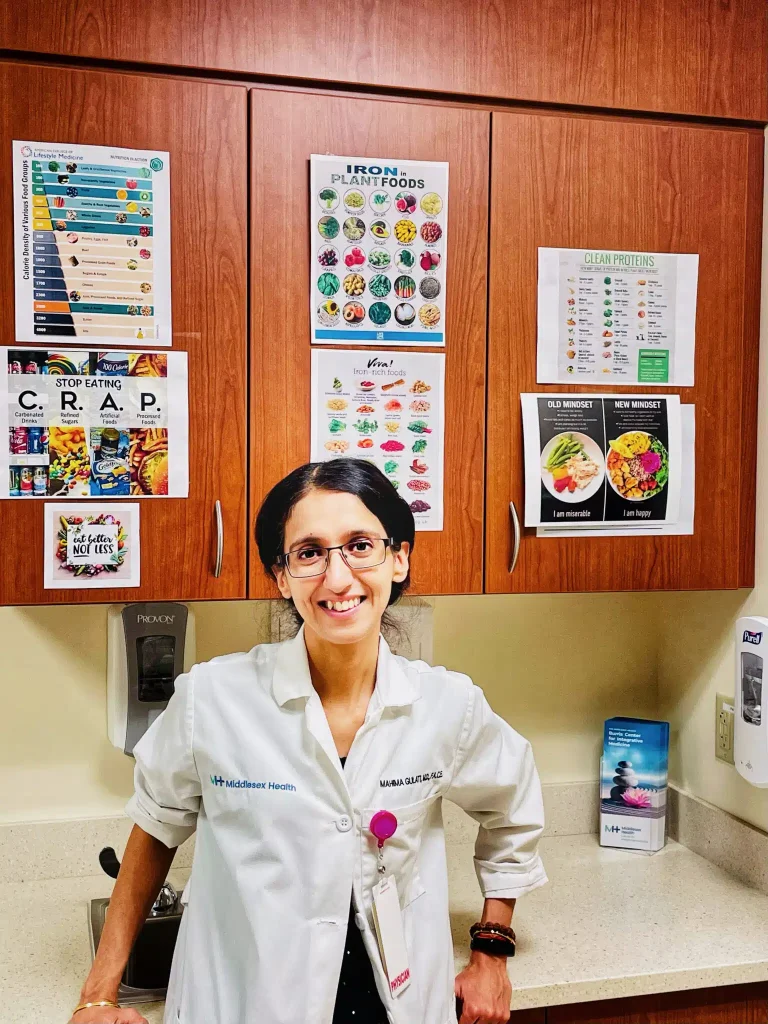Dr. Mahima Gulati emphasizes the profound impact of social determinants on health outcomes and underscores the transformative power of lifestyle medicine in improving both metabolic and mental health. The urgent call for the widespread adoption of lifestyle medicine in healthcare resonates as she delves into her unique perspective of the intersection of metabolic and mental well-being.
By Mahima Gulati, MD, DipABLM, FACLM
January 29, 2024

As a medical student, I trained in an impoverished, underserved region of Delhi, India. After I immigrated to the U.S. and started a medical internship in New York City’s Bronx borough, I was honored to care for an underserved population of mostly people of color and ethnic minorities. I was baffled by the similar catastrophic health consequences that I saw in the South Asian diabetes phenotype in India and that of the Bronx’s African American, Caribbean and Hispanic communities.
Later, I moved to Utah for an endocrinology fellowship and cared for the indigenous Native American populations in the mountain reservations of Idaho, Wyoming, Nevada and Utah. This offered me a window into the biological phenotype of type 2 diabetes in indigenous peoples.
A commonality among all these different diabetes population subtypes was enormous social deprivation, particularly to healthy food access. In the reservations of Nevada, there were no grocery or produce stores for hundreds of miles, and folks would have to drive over three to four hours just to get fruits and vegetables.
As a result, their pantry staples were refined flour, game meats and non-perishable items. Similarly, in Delhi, I worked in a region with one of the highest prevalences of tuberculosis infections in the world. Optimal nutrition, physical activity or monitoring blood sugar levels was the last thing on the people’s minds when they could barely procure adequate antitubercular antibiotics.
Another commonality I saw was immense mental and emotional strain caused by diabetes. For many people, managing and measuring their diabetes is a confusing and exhausting ordeal that can cause or exacerbate stress, anxiety and depression. A 2023 study found that diabetes can cause serious effects on mental health, particularly among younger people.
Mental health will likely be a growing concern as more young people are diagnosed with diabetes. One study predicted a 673% increase in type 2 diabetes diagnoses in Americans younger than 20 by 2060 if increasing trends continue. The study also forecast growing racial and ethnic disparities in type 2 diabetes prevalence, with the highest prevalence among Black youth.

The role for lifestyle medicine in T2D
Contemplating the gross disadvantages and inequities faced by multiple populations and cultures worldwide, I can’t help but wonder how their lives, health, and disease outcomes would be
different if they had easier and abundant access to affordable fresh vegetables and fruit? And what role can clinicians like me play in helping patients overcome these grueling social determinants?
It was sheer luck that I discovered lifestyle medicine at a conference for women physician leaders. Since I became board certified to practice lifestyle medicine, my clinical practice has been transformed. I realized how much I simply didn’t know! Lifestyle medicine and the American College of Lifestyle Medicine (ACLM) provide us the knowledge, resources and understanding to treat the root causes of type 2 diabetes. ACLM launched a Type 2 Diabetes Remission Certificate course in 2023, which is an incredible opportunity to gain deeper knowledge, competence, and confidence in treating type 2 diabetes with a goal of remission. I was unaware of the wealth of evidence that already exists about the impact our lifestyle behaviors can have on the leading chronic diseases in the U.S., and how practicing clinicians can address patients’ lifestyle habits during a routine office visit.
Among the lifestyle medicine resources that I employ in my daily clinical practice, my favorite go-to is a short two- to three-minute ACLM food frequency questionnaire that I use to track how patients are making dietary and exercise changes. I also routinely use a more thorough ACLM evaluation intake form for my new patients introducing the six pillars of lifestyle medicine, among other tools.
A patient story
I met 45-year-old Ms. Carmen (name and other identifying details changed to protect the patient’s and her family’s privacy) and her husband in early November 2023. Communicating through a Spanish translator, I learned she had type 2 diabetes since her early 30s, with universally poor sugar control and hemoglobin A1c usually >9-10% (ideal hemoglobin A1c levels should be <6.5% in a patient with diabetes).
Ms. Carmen was supposed to take two different kinds of insulin multiple times daily, but she was barely taking one of them once a day. Unfortunately, her son, who is now 16, developed type 2 diabetes at age 12. Carmen struggled with unrelenting depression, had tried multiple medications, and was even hospitalized in 2017 after a suicide attempt. She said that her depression prevented her from taking optimal care of her diabetes.
Near the end of her visit, Carmen told me she drinks at least two liters of soda each day. Since childhood, that bottle of soda was a source of comfort to her. She would even fight her siblings to keep them from drinking her soda. As an adult, she hides her soda bottles from her husband and son so they don’t drink it.
A lifestyle change
I was struck by her story. I thought of her son beginning his teenage years already facing a chronic illness. I was angry that sugar sweetened beverages are available for purchase in 2-liter bottles, a volume clearly excessive and damaging.
I looked Ms. Carmen in the eye and told her how much I appreciated her confiding in me. And that in return, I wanted her to trust me when I told her that her metabolic health IS her mental health. Her brain and body reside in the same building, and if her sugars are up and down, it will worsen her depression. And I wanted her to trust me when I told her that she would feel better if she took a small first step by reducing her soda intake and replacing it with something else, even diet soda or diet iced tea, for the time being.
If she did that, I told her, she could stop taking insulin (while continuing to take the rest of her diabetes medications, including metformin and semaglutide) but that she must return in two weeks so we could assess her progress closely.
A successful treatment
She did return in two weeks. And again in four weeks. By mid-December, Ms. Carmen was wearing her continuous glucose monitor sensor 88% of the time versus only 32% at her initial consult. Her average glucose was down to 135 mg/dL from 202 and she was now in target range of blood glucose (70-180 mg/dL) 93% of the time. (She was in target range only 36% of the time when she had seen me initially). She no longer experienced hypoglycemia because she was no longer on insulin. Her estimated sensor-derived hemoglobin A1c was now down to 6.5%, which was unprecedented for her!
Not looking back
Ms. Carmen told me she had not had any regular soda since her initial appointment and now only drinks one can of diet soda every other day. She lost about 8-10 pounds since her initial visit and maintained it despite a Thanksgiving vacation. I asked her why she made this change and gave up soda. She and her husband explained that she really wanted to feel better mentally and not feel depressed. It truly resonated with her when I told her that her glucose levels WOULD impact her subjective mood. Now that she feels the way she feels, she doesn’t wish to look back!
Her story is familiar to many clinicians. As an endocrinologist, if I got a penny for every time a patient quit sugar sweetened beverages and their diabetes improved, I’d be a millionaire. Ms. Carmen’s case again illustrates the pivotal importance of “we are what we eat (or drink).”
Are we ready for the future?
It is estimated that one in three U.S. adults could have diabetes by 2050. Are we ready for this tsunami? Do we have the drugs, the hospital beds, the healthcare professionals and the staffing to care for a growing and increasingly younger sick population, as well their related mental health needs?
I cannot imagine a future where lifestyle medicine is not the bedrock of a functioning healthcare system. Just like a human being needs oxygen to breathe and live, our healthcare needs lifestyle medicine not just to thrive, but survive. If we do not adopt lifestyle medicine foundationally, widely and urgently, we are fooling ourselves.